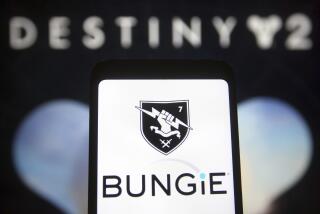Bungie splits from Activision, retains rights to its Destiny game series
- Share via
Two giants of the video game industry — Santa Monica’s Activision Blizzard and Washington-based game developer Bungie — are getting a surprise divorce, with just one year left to go on a 10-year contract inked in 2010.
Bungie announced the split in a blog post Thursday afternoon, and both companies published a joint statement confirming that Bungie will assume full rights and responsibilities for the “Destiny” franchise.
The relationship between the two companies had been showing strain for years. Activision, one of the industry’s largest players, is known for its devotion to a strict production schedule, delivering a new version of its massively successful “Call of Duty” series to fans each fall.
Bungie, the company behind the era-defining series “Marathon,” “Halo,” and “Destiny,” struggled to stick to its partner’s calendar. In the 2010 contract, Bungie committed to releasing new “Destiny” games every two years, beginning in the fall of 2013 — but the first installment shipped in 2014, with a second title going live in late 2017.
Late last year, Activision Chief Operating Officer Coddy Johnson said on an earnings call that “Destiny 2: Forsaken” had failed to meet Activision’s sales standards. A high-level Bungie developer shot back with a tweet that underlined the culture clash:
“When we first launched our partnership with Activision in 2010, the gaming industry was in a pretty different place,” Bungie wrote in its post. “As an independent studio setting out to build a brand new experience, we wanted a partner willing to take a big leap of faith with us. We had a vision for Destiny that we believed in, but to launch a game of that magnitude, we needed the support of an established publishing partner.”
In the intervening years, the rise of online games that are constantly updated has drastically changed the industry landscape, allowing game developers to sell their products straight to players without an intermediary publisher.
“Five to ten years ago, a publisher was critical for getting into big physical retailers,” said Mat Piscatella, U.S. video game industry analyst at NPD Group. “Nowadays there are a lot more options available.”
Chinese gaming and technology companies have grown in the last decade, as well, and serve as ready investors in independent American game studios. NetEase, the Chinese online gaming company that publishes Activision Blizzard’s “Overwatch,” “Hearthstone” and “World of Warcraft” games in China, invested $100 million in Bungie in June 2018.
A number of high-level executives have left Activision Blizzard in recent months, and the company faced customer backlash and a stock slump in November after announcing that the newest installment in its “Diablo” franchise would be a mobile game rather than a full PC title.
Bungie navigated a similarly turbulent relationship with a larger corporate partner in the early 2000s. It was acquired by Microsoft in 2000, where it developed the “Halo” series that made Microsoft’s Xbox a successful video game console, then split with the company in 2007, leaving its “Halo” franchise behind.
Activision Blizzard stock was down more than 6% in after-hours trading after the announcement.
Follow me on Twitter: @samaugustdean







